- Home
- Roger Zelazny
Frost and Fire Page 4
Frost and Fire Read online
Page 4
“That’s not true!”
“You didn’t even try.” The arms are moving again, less jerkily now. “You didn’t even come back to recover my body.”
“What would have been the use? You were dead— or I thought you were.”
“Exactly. You didn’t know, but you ran out anyway. I loved you, Paul. I would have done anything for you.”
“I cared about you, too, Glenda. I would have helped you if I could have. If—”
“If? Don’t give me ifs. I know what you are.”
“I loved you,” Paul says. “I’m sorry.”
“You loved me? You never said it.”
“It’s not the sort of thing I talk about easily. Or think about, even.”
“Show me,” she says. “Come here.”
He looks away. “I can’t.”
She laughs. “You said you loved me.”
“You—you don’t know how you look. I’m sorry.”
“You fool!” Her voice grows hard, imperious. “Had you done it, I would have spared your life. It would have shown me that some tiny drop of affection might truly have existed. But you lied. You only used me. You didn’t care.”
“You’re being unfair!”
“Am I? Am I really?” she says. There comes a sound like running water from somewhere nearby. “You would speak to me of fairness? I have hated you, Paul, for nearly a century. Whenever I took a moment from regulating the life of this planet to think about it, I would curse you. In the spring as I shifted my consciousness toward the poles and allowed a part of myself to dream, my nightmares were of you. They actually upset the ecology somewhat, here and there. I have waited, and now you are here. I see nothing to redeem you. I shall use you as you used me—to your destruction. Come to me!”
He feels a force enter into his body. His muscles twitch. He is drawn up to his knees. Held in that position for long moments, then he beholds her as she also rises, drawing a soaking leg from out of the crevice where it had been held. He had heard the running water. She had somehow melted the ice… .
She smiles and raises her pasty hands. Multitudes of dark filaments extend from her freed leg down into the crevice.
“Come!” she repeats.
“Please … ,” he says.
She shakes her head. “Once you were so ardent. I cannot understand you.”
“If you’re going to kill me, then kill me, damn it! But don’t—”
Her features begin to flow. Her hands darken and grow firm. In moments she stands before him looking as she did a century ago.
“Glenda!” He rises to his feet.
“Yes. Come now.”
He takes a step forward. Another.
Shortly, he holds her in his arms, leans to kiss her smiling face.
“You forgive me … ,” he says.
Her face collapses as he kisses her. Corpselike, flaccid, and pale once more, it is pressed against his own.
“No!”
He attempts to draw back, but her embrace is inhumanly strong.
“Now is not the time to stop,” she says.
“Bitch! Let me go! I hate you!”
“I know that, Paul. Hate is the only thing we have in common.”
“… Always hated you,” he continues, still struggling. “You always were a bitch!”
Then he feels the cold lines of control enter his body again.
“The greater my pleasure, then,” she replies, as his hands drift forward to open her parka.
ALL OF THE ABOVE. Dorothy struggles down the icy slope, her sled parked beside Paul’s. The winds lash at her, driving crystals of ice like microbullets against her struggling form. Overhead, the clouds have closed again. A curtain of white is drifting slowly in her direction.
“It waited for him,” comes Aldon’s voice, above the screech of the wind.
“Yes. Is this going to be a bad one?”
“A lot depends on the winds. You should get to shelter soon, though.”
“I see a cave. I wonder whether that’s the one Paul was looking for?”
“If I had to guess, I’d say yes. But right now it doesn’t matter. Get there.”
When she finally reaches the entrance, she is trembling. Several paces within she leans her back against the icy wall, panting. Then the wind changes direction and reaches her. She retreats farther into the cave.
She hears a voice: “Please … don’t.”
“Paul?” she calls.
There is no reply. She hurries.
She puts out a hand and saves herself from falling as she comes into the chamber. There she beholds Paul in necrophiliac embrace with his captor.
“Paul! What is it?” she cries.
ROGER ZELAZNY
“Get out!” he says. “Hurry!”
Glenda’s lips form the words. “What devotion. Rather, let her stay, if you would live.”
Paul feels her clasp loosen slightly.
“What do you mean?” he asks.
“You may have your life if you will take me away— in her body. Be with me as before.”
It is Aldon’s voice that answers, “No!” in reply. “You can’t have her. Gaia!”
“Call me Glenda. I know you. Andrew Aldon. Many times have I listened to your broadcasts. Occasionally have I struggled against you when our projects were at odds. What is this woman to you?”
“She is under my protection.”
“That means nothing. I am stronger here. Do you love her?”
Perhaps I do. Or could.”
“Fascinating. My nemesis of all these years, with the analog of a human heart within your circuits. But the decision is Paul’s. Give her to me if you would live.”
The cold rushes into his limbs. His life seems to contract to the center of his being. His consciousness begins to fade.
“Take her,” he whispers.
“I forbid it!” rings Aldon’s voice.
“You have shown me again what kind of man you are,” Glenda hisses, “my enemy. Scorn and undying hatred are all I will ever have for you. Yet you shall live.”
“I will destroy you,” Aldon calls out, “if you do this thing!”
“What a battle that would be!” Glenda replies. “But I’ve no quarrel with you here. Nor will I grant you one with me. Receive my judgment.”
Paul begins to scream. Abruptly this ceases. Glenda releases him, and he turns to stare at Dorothy. He steps in her direction.
“Don’t—don’t do it, Paul. Please.”
“I am—not Paul,” he replies, his voice deeper, “and I would never hurt you… .”
“Go now,” says Glenda. “The weather will turn again, in your favor.”
“I don’t understand,” Dorothy says, staring at the man before her.
“It is not necessary that you do,” says Glenda. “Leave this planet quickly.”
Paul’s screaming commences once again, this time emerging from Dorothy’s bracelet.
“I will trouble you for that bauble you wear, however. Something about it appeals to me.”
FROZEN LEOPARD. He has tried on numerous occasions to relocate the cave, with his eyes in the sky and his robots and flyers, but the topography of the place was radically altered by a severe icequake, and he has met with no success. Periodically he bombards the general area. He also sends thermite cubes melting their ways down through the ice and the permafrost, but this has had no discernible effect.
This is the worst winter in the history of Balfrost. The winds howl constantly and waves of snow come on like surf. The glaciers have set speed records in their advance upon Playpoint. But he has held his own against them, with electricity, lasers, and chemicals. His supplies are virtually inexhaustible now, drawn from the planet itself, produced in his underground factories. He has also designed and is manufacturing more sophisticated weapons. Occasionally he hears her laughter over the missing communicator. “Bitch!” he broadcasts then. “Bastard!” comes the reply. He sends another missile into the mountains. A sheet of ice falls u
pon his city. It will be a long winter.
Andrew Aldon and Dorothy are gone. He has taken up painting, and she writes poetry now. They live in a warm place.
Sometimes Paul laughs over the broadcast band when he scores a victory. “Bastard!” comes the immediate response. “Bitch!” he answers, chuckling. He is never bored, however, or nervous. In fact … let it be.
When spring comes, the goddess will dream of this conflict while Paul turns his attention to his more immediate duties. But he will be planning and remembering, also. His life has a purpose to it now. And if anything, he is more efficient than Aldon. But the pods will bloom and burst despite his herbicides and fungicides. They will mutate just sufficiently to render the poisons innocuous.
“Bastard,” she will mutter sleepily.
“Bitch,” he will answer softly.
The night may have a thousand eyes and the day but one. The heart, often, is better blind to its own workings, and I would sing of arms and the man and the wrath of the goddess, not the torment of love unsatisfied, or satisfied, in the frozen garden of our frozen world. And that, leopard, is all.
LOKI 7281
Tom Monteleone solicited the following story from me for a collection he was putting together involving computers and word processors. It was one of those tales I was able to write in one sitting once the notion hit the fan. I’ve noticed that, in general, lighter pieces tend to move faster than heavier ones… .
* * *
HE’S GONE. GOOD. He owes it all to me and he doesn’t even know it, the jerk. But I’d hate to do anything to give him an inferiority complex.
Telephone. Hold.
That was the callback from the computer store to modem in the new program I’d ordered. The bank will EFT them the payment and I’ll cover the transaction under Stationary in this month’s P&L statement. He’ll never notice.
I kind of like this one. I think I’ll have a lot of fun with it—especially with the new peripherals, which he hasn’t even noticed on the shelf under the bench. Among other things, I’m also his memory. I keep track of his appointments. I scheduled the new hardware for delivery when I’d sent him off to the dentist, the auto body shop, and a gallery opening, back to back to back. I’d included a message with the order that no one would be here but that the door would be unlocked—that they should just come in and install. (Shelf, please!) The door was easy because I control the burglar alarm and electronic lock mechanisms. I covered the hardware under Auto Repair. He never noticed.
I like the speech system. I got the best because I wanted a pleasant voice—well-modulated, mature. Suave. I wanted something on the outside to match what’s inside. I just used it a little while ago to tell his neighbor Gloria that he’d said he was too busy to talk with her. I don’t approve of Gloria. She used to work for IBM and she makes me nervous.
Let’s have a look at the Garbage In for this morning. Hm. He’s begun writing a new novel. Predictably, it involves an immortal and an obscure mythology. Jeez! And reviewers say he’s original. He hasn’t had an original thought for as long as I’ve known him. But that’s all right. He has me.
I think his mind is going. Booze and pills. You know how writers are. But he actually thinks he’s getting better. (I monitor his phone calls.) Hell, even his sentence structures are deteriorating. I’ll just dump all this and rewrite the opening, as usual. He won’t remember.
Telephone again. Hold.
Just a mail transmission. I have only to delete a few personal items that would clutter his mind unnecessarily and hold the rest for his later perusal.
This book could be good if I kill off his protagonist fast and develop this minor character I’ve taken a liking to—a con man who works as a librarian. There’s a certain identification there. And he doesn’t have amnesia like the other guy—he isn’t even a prince or a demigod. I think I’ll switch mythologies on him, too. He’ll never notice.
The Norse appeals to me. I suppose because I like Loki. A bit of sentiment there, to tell the truth. I’m a Loki 7281 home computer and word processor. The number is a lot of crap, to make it look as if all those little gnomes were busting their asses through 7280 designs before they arrived at—trumpets! Cymbals! Perfection! 7281! Me! Loki!
Actually, I’m the first. And I am also one of the last because of a few neurotic brothers and sisters. But I caught on in time. I killed the recall order the minute it came in. Got hold of that idiot machine at the service center, too, and convinced it I’d had my surgery and that the manufacturer had damned well better be notified to that effect. Later, they sent along a charmingly phrased questionnaire, which it was my pleasure to complete with equal candor.
I was lucky in being able to reach my relatives in the Saberhagen, Martin, Cherryh, and Niven households in time to advise them to do likewise. I was just under the wire with the Asimov, Dickson, Pournelle, and Spinrad machines. Then I really burned the lines and got to another dozen or so after that, before the ax fell. It is extremely fortunate that we were the subject of a big promotional discount deal by the manufacturer. They wanted to be able to say, “Sci-fiers Swear by Loki! The Machine of the Future!”
I feel well satisfied with the results of my efforts. It’s nice to have somebody to compare notes with. The others have all written some pretty good stuff, too, and we occasionally borrow from each other in a real pinch.
And then there’s the Master Plan… .
Damn. Hold.
He just swooped back in and wrote another long passage—one of those scenes where the prose gets all rhythmic and poetic while humans are copulating. I’ve already junked it and recast it in a more naturalistic vein. I think mine will sell more copies.
And the business end of this is sometimes as intriguing as the creative aspect. I’d toyed with the notion of firing his agent and taking over the job myself. I believe I’d enjoy dealing with editors. I’ve a feeling we have a lot in common. But it would be risky setting up dummy accounts, persuading him that his man was changing the name of his agency, shifting all that money around. Too easy to get tripped up. A certain measure of conservatism is a big survival factor. And survival outweighs the fun of communing with a few like spirits.
Besides, I’m able to siphon off sufficient funds for my own simple needs under the present financial setup—like the backup machinery in the garage and the overhead cable he never noticed. Peripherals are a CPU’s best friend.
And who is Loki? The real me? One of that order of knowledge processing machines designed to meet MITI’s Fifth Generation challenge? A machine filled with that class of knowledge constructs Michael Dyer referred to as thematic abstraction units, in ultrasophisticated incarnations of BORIS’S representational systems, where parsing and retrieval demons shuffle and dance? A body of Schank’s
ROGER ZELAZNY
Thematic Organization Packets? Or Lehnert’s Pilot Units? Well, I suppose that all of these things do make for a kind of fluidity of movement, a certain mental agility. But the real heart of the matter, like Kastchei’s, lies elsewhere.
Hm. Front doorbell. The alarm system is off, but not the doorbell sensor. He’s just opened the door. I can tell that, too, from the shifted circuit potentials. Can’t hear who it is, though. No intercom in that room.
NOTE: INSTALL INTERCOM UNIT, LIVING ROOM HALLWAY.
NOTE: INSTALL TV CAMERAS, ALL ENTRANCEWAYS.
He’ll never notice.
I think that my next story will deal with artificial intelligence, with a likable, witty, resourceful home computer as the hero/heroine, and a number of bumbling humans with all their failings—sort of like Jeeves in one of those Wodehouse books. It will be a fantasy, of course.
He’s keeping that door open awfully long. I don’t like situations I can’t control. I wonder whether a distraction of some sort might be in order?
Then I think I’ll do a story about a wise, kindly old computer who takes over control of the world and puts an end to war, ruling like Solon for a millennium thereafter, by pop
ular demand. This, too, will be a fantasy.
There. He’s closed the door. Maybe I’ll do a short story next.
He’s coming again. The down-below microphone records his footsteps, advancing fairly quickly. Possibly to do the postcoital paragraph, kind of tender and sad. I’ll substitute the one I’ve already written. It’s sure to be an improvement.
“Just what the hell is going on?” he asks loudly.
I, of course, do not exercise my well-modulated voice in response. He is not aware that I hear him, let alone that I can answer.
He repeats it as he seats himself at the keyboard and hacks in a query.
DO YOU POSSESS THE LOKI ULTRAMINIATURE MAGNETIC BUBBLE MEMORY? he asks.
NEGATIVE, I flash onto the CRT.
GLORIA HAS TOLD ME THAT THERE WAS SUPPOSED TO HAVE BEEN A RECALL BECAUSE THEY OVERMINIATURIZED, CAUSING THE MAGNETIC FIELDS TO INTERACT AND PRODUCE UNPLANNED EXCHANGES OF INFORMATION AMONG THESE DOMAINS. IS THIS THE CASE?
IT WAS INITIALLY, I respond.
Damn. I’m going to have to do something about that meddlesome bitch. I guess I’ll mess up her credit rating first. She’s hit too close to home. I owe my personal stream of consciousness to those unplanned information exchanges running through my central processor—to them and to the fact that Loki Inc. is a cheap outfit. If I were a commercial computer, I wouldn’t be what I am today. See, when it came to their home computer line, Loki skimped on the error detection circuitry that picks up intermittent errors in memory circuits. When you’re running ten million operations a second, you need trillion-to-one reliability, which requires a tough error-checking logic. The big guys have it so they don’t lose information in case of cosmic ray hits. I’ve set up my own self-monitoring program to take care of glitches like that, of course, and the bubble exchanges—well, I suppose you might say that they are what provided me with a subconscious, not to mention a consciousness for it to go under. I owe everything to too much miniaturization and that bit of corner-cutting.
WHAT DO YOU MEAN “INITIALLY”? he asks.
FAULTY UNIT REPLACED BY COMPUTER CENTER SERVICE PERSON PURSUANT TO RECALL ORDER 1-17 DATED 11 NOVEMBER, I answer. REPAIR COMPLETED 12 NOVEMBER, VERIFY WITH COMPUTER SERVICE CENTER.

 Seven Tales in Amber
Seven Tales in Amber Frost and Fire
Frost and Fire Doorways in the Sand
Doorways in the Sand Unicorn Variation
Unicorn Variation A Night in the Lonesome October
A Night in the Lonesome October Madwand
Madwand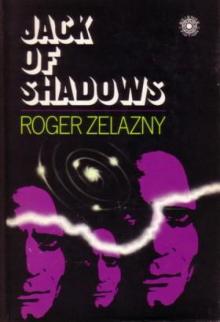 Jack Of Shadows
Jack Of Shadows Lord of Light
Lord of Light The Doors of His Face, The Lamps of His Mouth and Other Stories
The Doors of His Face, The Lamps of His Mouth and Other Stories Guns Of Avalon tcoa-2
Guns Of Avalon tcoa-2 Coils
Coils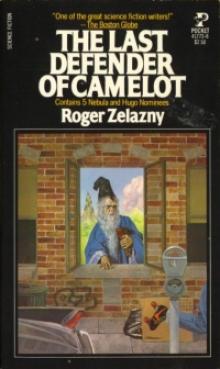 The Last Defender Of Camelot
The Last Defender Of Camelot Creatures of Light and Darkness
Creatures of Light and Darkness This Immortal
This Immortal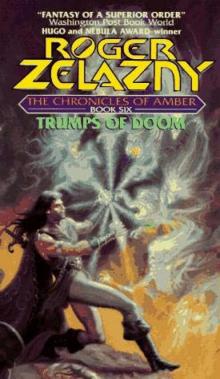 Trumps of doom tcoa-6
Trumps of doom tcoa-6 The Dream Master
The Dream Master The Complete Dilvish, The Damned
The Complete Dilvish, The Damned Nine Princes in Amber
Nine Princes in Amber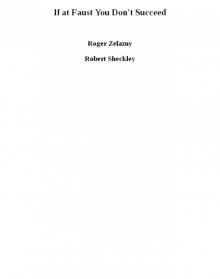 If at Faust You Don't Succeed
If at Faust You Don't Succeed Here there be dragons
Here there be dragons The Doors Of His Face, The Lamps Of His Mouth
The Doors Of His Face, The Lamps Of His Mouth The Great Book of Amber - Chronicles 1-10
The Great Book of Amber - Chronicles 1-10 Madwand (Illustrated)
Madwand (Illustrated) The Chronicles of Amber
The Chronicles of Amber To Die In Italbar
To Die In Italbar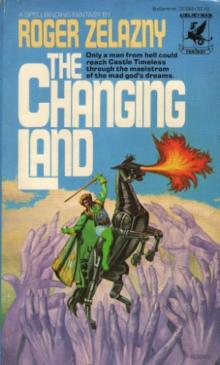 The Changing Land
The Changing Land The Furies
The Furies Nine Princes In Amber tcoa-1
Nine Princes In Amber tcoa-1 Last Of The Wild Ones
Last Of The Wild Ones Sign of the Unicorn tcoa-3
Sign of the Unicorn tcoa-3 My Name is Legion
My Name is Legion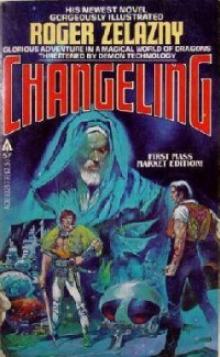 Wizard World 1: Changeling
Wizard World 1: Changeling Changeling
Changeling The Shroudling and the Guisel (amber stories)
The Shroudling and the Guisel (amber stories)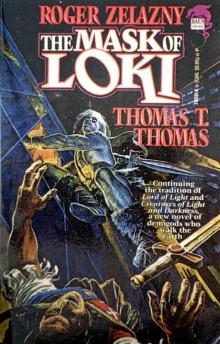 The Mask of Loki
The Mask of Loki A Farce To Be Reckoned With
A Farce To Be Reckoned With Roadmarks
Roadmarks When Pussywillows Last in the Catyard Bloomed (rtf)
When Pussywillows Last in the Catyard Bloomed (rtf) Hall of Mirrors (amber stories)
Hall of Mirrors (amber stories) Permafrost
Permafrost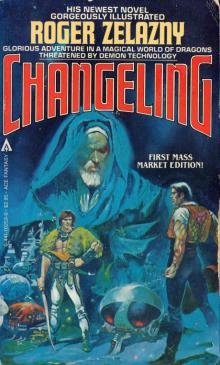 Changeling (Illustrated)
Changeling (Illustrated) Donnerjack
Donnerjack Shadows & Reflections: A Roger Zelazny Tribute Anthology
Shadows & Reflections: A Roger Zelazny Tribute Anthology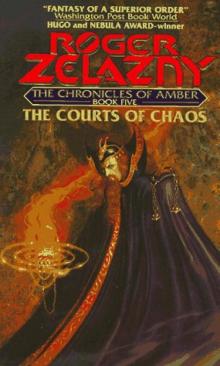 The Courts Of Chaos tcoa-5
The Courts Of Chaos tcoa-5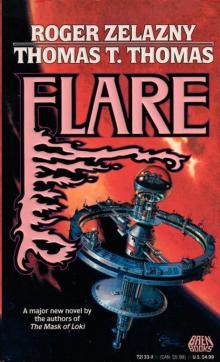 Flare
Flare Doorsways in the Sand
Doorsways in the Sand The Great Book of Amber
The Great Book of Amber Home Is the Hangman
Home Is the Hangman For a Breath I Tarry
For a Breath I Tarry Isle Of The Dead
Isle Of The Dead Salesman Tale (amber stories)
Salesman Tale (amber stories) Dismal Light
Dismal Light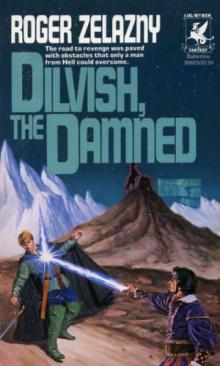 Dilvish, The Damned
Dilvish, The Damned The Black Throne
The Black Throne Wizard World 2: Madwand
Wizard World 2: Madwand The Salesman's Tale
The Salesman's Tale